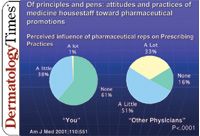- Acne
- Actinic Keratosis
- Aesthetics
- Alopecia
- Atopic Dermatitis
- Buy-and-Bill
- COVID-19
- Case-Based Roundtable
- Chronic Hand Eczema
- Chronic Spontaneous Urticaria
- Drug Watch
- Eczema
- General Dermatology
- Hidradenitis Suppurativa
- Melasma
- NP and PA
- Pediatric Dermatology
- Pigmentary Disorders
- Practice Management
- Precision Medicine and Biologics
- Prurigo Nodularis
- Psoriasis
- Psoriatic Arthritis
- Rare Disease
- Rosacea
- Skin Cancer
- Vitiligo
- Wound Care
Article
Awareness of financial conflicts growing
On a larger scale, he notes that few, if any, medical conferences could survive as currently structured without heavy subsidies from the pharmaceutical industry.

"It's an exciting time to be following this topic," says Jeffrey J. Meffert, M.D., a dermatologist in private practice and associate clinical professor of dermatology at the University of Texas Health Science Center, San Antonio. "More people are starting to agree that there is a problem. This may relate to the dramatically increasing money being spent on marketing and sunk into dermatologic continuing medical education (CME) and to a growing background murmuring that this may be a real ethics issue."
'Tip of the iceberg'
"These things do affect one's prescribing habits. While most physicians believe that their compatriots can be swayed, they don't believe they, themselves, can be," Dr. Meffert says.
According to one study, 30 percent of physicians said their colleagues were significantly affected by pharmaceutical companies' gifts, but only 1 percent thought they, themselves, were affected (Steinman MA, Shlipak MG, McPhee SJ. Am J Med. 2001 May;110(7):551-557).
Dr. Meffert adds, "Drug companies' influence on our CME, even beyond basic research - which pharmaceutical company money plays a big role in directing - is a concern to those of us who want truly unbiased literature, studies and CME."
He reveals that when he spoke on the topic of drug companies' influence at a major dermatology conference last year, employees from pharmaceutical companies, many of them non-physicians, made up 15 percent of his audience. Not surprisingly, he says, reviews of his presentation were 85 percent positive, 15 percent negative.

"Concerned citizens furthermore see a big problem with the huge sums of money that are spent on pharmaceutical industry marketing," he says. "No one's kidding themselves; the costs of marketing are being passed on to the patient, and the excessive marketing costs and excessive numbers of people on the marketing side of any pharmaceutical company are among the chief reasons for the high cost of U.S. healthcare right now."
Dr. Meffert notes that in 2002, drug companies' promotional expenditures totaled $21 billion (source: IMS Health, a research firm dedicated to the pharmaceutical and healthcare industries).
"Thirty-nine percent of drug company employees' main job is marketing. Another 11 percent are in administration, whereas research and development, production, quality control and distribution account for about half of the employees' (responsibilities) (Pharmaceutical Research and Manufacturers of America/PhRMA Industry Profile 2000)," he adds.
'This is America'
Dr. Meffert says what makes the above figures more irritating to socially concerned physicians is that, by all measures, pharmaceutical companies earn the highest profit margins of any comparable companies, including reference Fortune 500 companies.
Newsletter
Like what you’re reading? Subscribe to Dermatology Times for weekly updates on therapies, innovations, and real-world practice tips.














